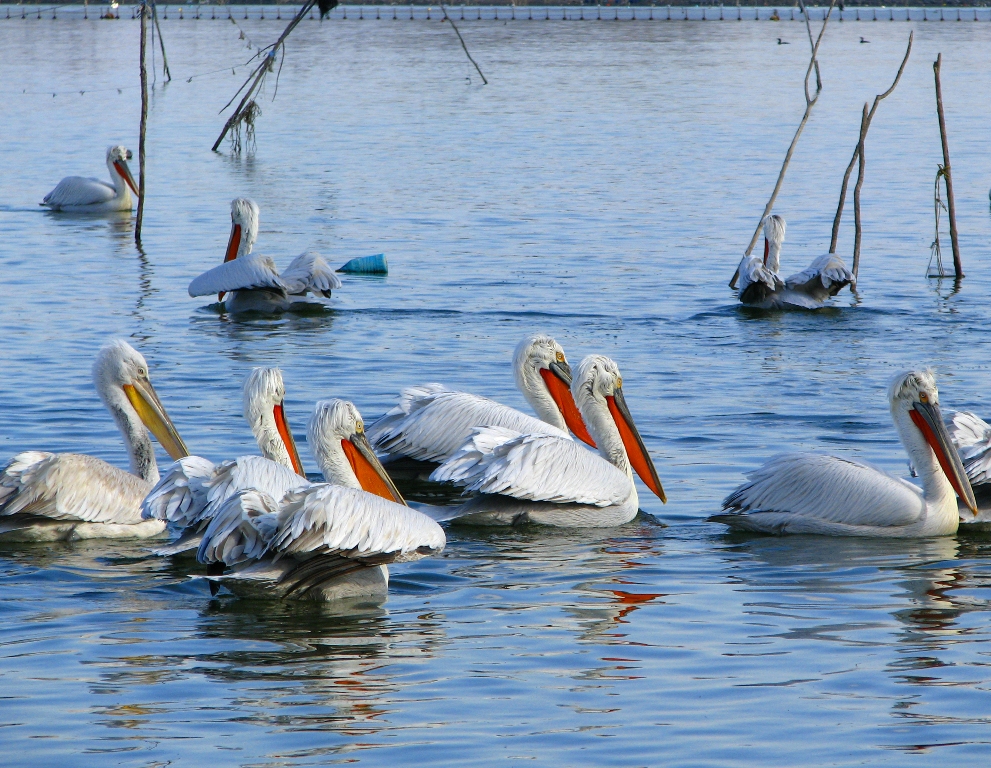The second national pelican census was held on the 5th of April 2014 in forty five wetlands throughout the country. Twelve management bodies were involved as well as a number of twenty volunteers from the network of the Hellenic Ornithological Society (HOS). The census was carried out at the two Prespa lakes near the borders shared by Albania, Greece and the Former Yugoslav Republic of Macedonia, in collaboration with the management body of the Albanian Prespa Park and the environmental organization MES of the Former Yugoslav Republic of Macedonia.
This action was an initiative of the Society for the Protection of Prespa (SPP) and the Hellenic Ornithological Society (HOS) and involved a national census of the two species of pelican: the globally endangered Dalmatian Pelican (Pelecanus crispus) and the White Pelican (Pelecanus onocrotalus). The census was carried out in collaboration with the Management Bodies for Protected Areas: the Management Body (MB) for the Evros Delta, the MB for the Nestos Delta - Vistonida - Ismarida, the MB for Lake Koroneia - Lake Volvi, the MB for Lake Kerkini, the MB for the Axios Delta - Loudias - Aliakmonas, the MB for the Prespa National Park, the MB for Lake Pamvotida, the MB for Karla - Mavrovouni - Kephalovryso - Velestino, the MB for the Amvrakikos Wetlands, the MB for the Kotychi - Strophilia Wetlands and the MB for the Messolonghi Lagoon as well as the MB for Stena and Acherontas and Kalamas estuaries.
In total, more than eighty people participated in the census, including staff from the management bodies, members of three NGOs and volunteer birdwatchers that recorded around the same time in the afternoon:
• 4043 Dalmatian Pelicans, almost 500 more than last year.
• 437 White Pelicans , almost 250 less than last year.
More specifically, a total of 4043 Dalmatian pelicans were recorded in twenty three of the country’s wetlands, 437 white Pelicans in eight wetlands, while both species were recorded as being present together in eight of the forty five wetlands where the census took place.

Due to awful weather conditions, in many parts of the country, the visibility was bad and rendered the task of recording the pelicans technically impossible for many of the participants. For this reason it was not possible to distinguish between immature and adult birds, something that is already hard due to the great distance that exists from the points of observation and the overcrowding of birds at perching sites.
The census this year took place three weeks earlier than last year and this probably explains the smaller number of White Pelicans, as they had not completed their migration. The planning team for the coming years’ measurement will take this into account.
The aim of the census was to gauge the total number of pelicansthat uses the wetlands of Greece during the breeding season. The data obtained will be used to help plan protective measures, for the conservation and management of pelicans in the country, which is especially important in the case of the Dalmatian Pelican. This is a species of international concern, for which Greece bears a very great responsibility as Lesser Prespa Lake hosts the largest colony of the species in the world (about 1,200 pairs) and overall Greece is home to more than 25% of the world population!
Of central importance for the protection and conservation of the two species are the wetlands where they breed (Small Prespa Lake, Kerkini Lake, the Ambracian wetlands, Messolonghi Lagoon and Karla) where as expected, significant numbers were recorded. The remaining wetlands are used by pelicans to meet their needs of food and rest, as stations during their migration or quite possibly as some form and potential nesting sites.
An urgent need has been recognized through this National Pelican Census in the country’s wetlands: the need for integrated protection and proper management of all wetlands of the country. It also highlights the importance of cooperation not only for large-scale operations, but for a number of issues related to wetlands in the country that demand the formation of partnerships.
To see the results of the census click here
The census was carried out thanks to the following participants whom we thank: Helen Makriyannis, Patetsini Euterpe, Zlatini Paschalio, Terzis Vasilis Christidis Aris, Donth J. Stefan, Naziridis Theodoros, Kostas Papadopoulos, Karta Lila, Patsia Athena, Ellada Tserkezidou, Stamatis Joanna, Vafiadou Anthi, Hatzipapas Nikos, Panagiotopoulou Maria, Panayotidis Christo,s Giamouzis Vasilis, Katrana Eva, Alvanou Lydia, Kourouzidis Harris, Alexandrou Olga, Voglidis Takis, Papadopoulou Leto, Vassilis Papadopoulos, Christina Louka, Malakou Myrsine, Nicholas Harris, Irene Koutserou, Nicolaou Lazaros, Logotheti Annita, Henderson Julia, Avramoski Oliver, Arsovska Ana, Putilin Ksenija, Petri Lazjon, Mazenkofski Andon, Bobou Eleni, Toskos Christos, Nikos Panagiotopoulos, Kalpakidis Damianos, Chalkia Stavroula, Michalakis Dimitris, Papadimitriou Dote, Delivasi Georgia, Katsadorakis George, Polymeros Stavros , Vlachopoulos Kostas, Ksyrafis Stratos, Karousou Demeter, Papatheodorou Sophia ,Christina Ntrougia, Nitas Panagiotis, Christos Felias, Boukas Nikos, Galani Tonia, Martinis Anestis, Mantos Andreas, Constantinis Alexander, Kostas Passas, Barellos Dimitris, Floudas Costas, Gerokostas Giannis, Kasvikis Giannis, Chryssopoulos Sotiris, Palaios Nikos, Pergantis Fotis, Noulas Nikos, Roussopoulos Giannis, Karagiannis Evangelia, Sourmelis Anastasios, Orfanou Basiliki, Mamassis Dionysis, Lymperopoylos Nikos, Chalkiopoulou Amalia, and Evi Syntichaki, Papandropoulos Dimitris.



